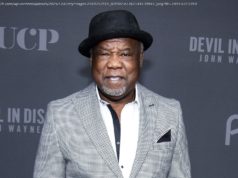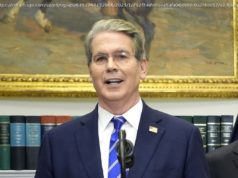Save for a few peaceful patches in the commencement program—when the concert chorale sang, when the brass band played, when the charismatic chaplain called graduates and guests to prayer—students at the historically black Bethune-Cookman University’s commencement ceremony on Wednesday clamored and shouted steady expressions of dissent…
Save for a few peaceful patches in the commencement program—when the concert chorale sang, when the brass band played, when the charismatic chaplain called graduates and guests to prayer—students at the historically black Bethune-Cookman University’s commencement ceremony on Wednesday clamored and shouted steady expressions of dissent.
Protest has been mounting since Bethune-Cookman president Edison O. Jackson announced last week that Education Secretary Betsy DeVos would be this year’s commencement speaker. And at the ceremony Wednesday afternoon, it was President Trump’s name—unavoidably peppered throughout the dean’s formal introduction of DeVos—that set off the crowd.
The decibel level of the students’ vocal protest, ranging from a raucous roar to collective cheering when one student raised his fist to signal «black power» while being escorted out of the auditorium, contrasted the silent simplicity of past commencement protests. In 1991, students at Hampton College protested President George H. W. Bush by abrupting sitting when «Hail to the Chief» played. Students today stood with their backs turned to DeVos—but in the age of the livestream (17,000 tuned in to B-CU’s website to catch the spectacle) , noise-making matters more. Viewers at home will have heard the steady booing from students not on camera. And we heard, for instance, the young man who shouted, «Aw shut the f*** up, » an expression of exasperation well-received by his peers, during DeVos’s address.
Her speech really did seem to have been written for such an occasion. Betsy DeVos, and her speech writing team, were prepared to be jeered, in other words. She started out acknowledging the mothers, then the fathers, then the grandparents in the audience—those who’d guided these soon-to-be graduates to such a milestone. It’s a none-too-subtle plug for parent choice, sure, but it’s also a reminder to young adults that their parents are watching. And not just their parents. Their grandparents. Indiscernible chants and rumblings followed what, given the unfortunate context, came off like a scold: «Your actions…» Apart from a few lone shouts, the crowd quieted down during her pious nod to Dr. Mary McLeod Bethune, the school’s famous and beloved founding mother:
As one of 17 children born to parents who knew firsthand the horrors and injustice of slavery, Dr. Bethune was the only member of her family to be educated in a formal school setting. For her, education was a gift and an incredible privilege. She believed it was her sacred duty to use her education to uplift others. So in 1904, with a burning determination in her soul and a meager dollar-fifty in her pocket, Dr. Bethune built a school from the ground up. Over the course of her incredible 79-year lifespan, she fought for one singular and invaluable goal: to provide African-American children access to a quality education, access they were otherwise unjustly denied.
But, moments later, when DeVos said she would visit Bethune’s house and grave that day, students’ cries of dissent peaked as though they were in agony at the very thought of an in-person tribute from the Trump appointee. However, when DeVos singled out certain students for congratulations, members of the class of 2017 who’d overcome adversity, the community of graduates came together in gracious good cheer.
Although I have to believe she was unsurprised by the booing, she looked a little surprised, or at least was visibly grateful, to be applauded in a show of solidarity from standing deans, administrators, trustees, and the day’s other honorary degree recipient—Daytona Beach mayor Derrick Henry—all alongside her on the dais. The mayor, in his short address, told students something they seemed to have already grasped. «Many people have said that this day is about some other things, but I’ve come to remind you that this day is about you.» Students have every right to scream and shout if their speaker does not represent their political attitudes, he might have said instead, in the interest of nail-on-head alignment.
It’s HBCU advocates like Johnny C. Taylor, Jr., president of the Thurgood Marshall College Fund, who tend to lead, on the other hand, with the idea that members of the HBCU community share a linked fate. They ought to take full advantage, therefore, of a seat at the proverbial table—DeVos did, reportedly, join Bethune-Cookman students for a roundtable discussion on Wednesday morning—with those empowered to influence policies for the good of these colleges’ funding and development. And it’s on DeVos to show up, well aware of the angry emotions she’ll meet. «I give her credit for being willing to go into a situation you know is going to be met with some degree of hostility, » Taylor told me last week. «It’s not like Barack Obama walking into Morehouse.»
DeVos is just the sort of public figure Mary McLeod Bethune’s memory should encourage students to engage with respectfully and influence, Jackson said in his statement to students last week: «Perhaps Secretary DeVos, much like those early initial skeptics that Dr. Bethune invited to visit and speak on this campus, will be inspired by the profound work that occurs here with our students, » he wrote.
Omarosa Manigault, the White House liaison, Trump loyalist, and fiery Apprentice alumna, accompanied DeVos on the dais. When President Jackson thanked her for joining them, her name roused the event’s first thunderous jeers. To Manigault’s dissenters, this president said, «You don’t know her. Nor do you know her story, » but the shouts only intensified. Maybe they did know that she’d been the architect of the early February executive order in support of historically black colleges and universities and that she’d graduated from two HBCUs herself—maybe they didn’t.
Every graduation carries a sense of profound release.






